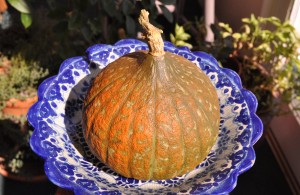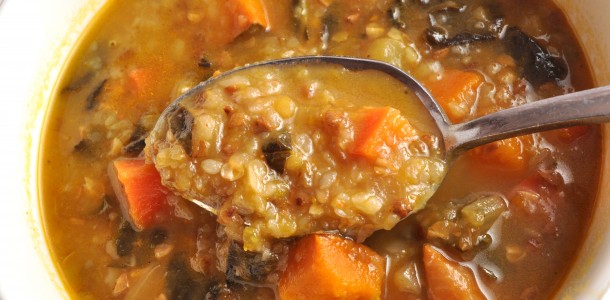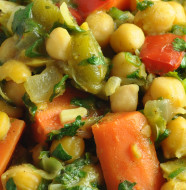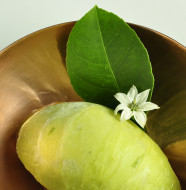This has been by far the coldest winter since we moved to Colorado twelve years ago. The good news is that it has given me plenty of excuses to make (and eat) a lot of soup, one of my favorite forms of food. Coincidentally, in recent years my wife has begun growing kabocha squash, which has become my new favorite, edging zucchini into second place. Last summer we were visited in the early hours by a hungry bear, who helped himself to the six largest kabochas before we let the dogs out to chase him away. Curses! Oh well, small price to pay for living on the side of a mountain surrounded by glorious nature. The squashes that survived are comparatively small, but it turns out they’re just the right size to make a medium pot of soup.

I discovered only recently that kabochas can be eaten skin and all, which makes preparing them a lot easier than other, much tougher-skinned squashes that require peeling. I’ve always been told that “most of the nutrition” is in the skins of pretty much every vegetable I’ve preferred to peel. In many cases I’ve ignored this bit of lore because I like to enjoy my food, and tough, leathery skin pretty much ruins it for me. However, much to my surprise, I found that kabocha skin becomes quite tender if you simmer it long enough.
A few nights ago I made what turned out to be a surprisingly delicious soup. It began innocently enough—just a basic minestrone-style affair, with sautéed onions, celery, bell pepper, zucchini, chunks of kabocha, a little roasted garlic puree (quite a bit, actually), and coarsely chopped kale. Then suddenly it veered off on an exotic vector, with the addition of Aleppo pepper, smoked paprika, and baharat (a unique spice mixture used in the cuisines of Iraq and the Gulf states)*. I added quite a bit of rich vegetable broth, got it bubbling happily, and from there it proceeded without incident until I began to get a sense that something was missing. At first, I didn’t trust the feeling; it was looking and smelling perfectly good enough. But the kitchen gods have a way of leading me along, and I’ve come to enjoy letting it happen. I wandered over to my pantry and suddenly my hand rested on a jar of kasha (a.k.a. buckwheat). I resisted at first, but they were very clear about it, so in went a giant handful. I covered the pot and let the soup cook at a bare simmer for about 45 minutes longer.
When the soup was done, it had a texture and aroma I had never encountered before. Rich, very slightly smoky, with hints of Eastern spice and heat, and a soft, silky graininess. The flavor had all the minestrone elements, but it was wild, with subtle Middle Eastern flashes and a gently assertive buckwheat presence. I was glad I hadn’t overdone it on the baharat, because it came through just as a backnote, something no one would even catch, let alone wonder about.
We ate the soup for two days, and then I made it again. When I finish writing this, I’m going to heat up another bowlful. I think that fairly summarizes the unusual delicacy of this dish.
It’s exciting, inspiring, and more than a little humbling for me to be a part of any creative process. If I’m paying attention at all, it’s glaringly obvious that we’re all mere conduits for the divine, that as Alan Watts observed, “The individual is an aperture through which the supreme existence is conscious of itself, by virtue of our limitations.” That’s quoted from memory, and I haven’t seen the book since I was out seeking Truth in the early ’70s, but close enough. Ask any great (and honest) artist, musician, designer, architect, or anyone who stretches the envelope of what can be known or done, and I’d be willing to bet every one of them will admit it all just comes to them. That’s why I’m here, on Earth, doing what I do…
* Note: If you follow the link above, find baharat at the Savory Spice Shop site, and decide to order some, I would appreciate it if you patronize the specific shop in Colorado Springs, as it is owned and managed by a good friend of mine, Dick Frieg. To do this (and it won’t cost you a cent more), send an email to: coloradosprings@savoryspiceshop.com or call: (719) 633-8803. Once you’re registered as a customer of that specific shop, in the future you can just go to the Savory Spice Shop website, place an order, and my friend will reap the benefit. Thanks!









